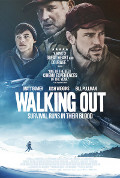
Directed by
Alex Smith / Andrew J. Smith
96 minutes
Rated M
Reviewed by
Bernard Hemingway

Walking Out
Synopsis: 14-year old David (Josh Wiggins) arrives at a regional airport in Montana to visit his father, Cal (Matt Bomer) who wants to take him moose-hunting. A suburban city kid, David is not keen on the idea but when the hunt goes wrong he proves to be everything his father could have wanted him to be.
Walking Out is a paradigmatic Sundance film (it actaully won the Grand Jury Prize at Sundance 2017), an independent production that presents its purposely underplayed wilderness adventure story with well-judged restraint and a strong emphasis on visual story-telling. It is in this respect somewhat stylistically self-conscious but it is also a thoughtful and worthwhile film.
Working from a 1988 short story by David Quammen, brothers Alex and Andrew J. Smith launch immediately into establishing the prickly generational gap between David’s “soft” values and his father’s backwoods ethic, one which the latter learned from his own father (played in flashbacks by a virtually dialogue-less Bill Pullman). The uneasiness of the relationship is further exacerbated by the fact that David has been brought up by his mother. After a disappointing start to their hunt an accident leaves Cal unable to walk and David has no choice but to carry his father to safety.
As co-writers and co-directors the Smith brother give us a cannily simple study of the death of the myth of American frontier manhood set in the snow-covered mountains surrounding Montana's Paradise Valley. Still trying to live up to his own father, Cal desperately wants to pass on to his son his haunted ideas of living in Nature but this same desperation is exactly what ultimately leads him to place their lives in jeopardy. The outcome is an inversion of the relationship he desired as he becomes dependent on his son whilst the latter finds in himself a strength he never knew he had.
It is a poignant story which is tellingly photographed by Todd McMullen and evocatively underpinned by Ernst Reijseger’s Baroque-influenced cello and piano score. There are a couple of odd scenes in which David imagines a happier time when they have escaped their situation, insertions that could have been left on the cutting room floor, and it seemed to me that the Smiths manipulate us ever so slightly in bringing the tale to a close with a final shot of Cal in bed. For the most part, however, they let the story tell itself without contrivance and that is quite enough.
FYI: David carries Cal off the mountain piggy-back style. Although the Smiths make this work it is hard to accept, particularly as David has a much lighter build than his father, let alone adding the difficulty of walking in thick snow. Should you ever find yourself in a similar situation, as I understand it, the most effective way of carrying someone is to sling them across your shoulders, holding one arm and one leg in front of you, thus using the full strength of your frame to bear their weight.

Want more about this film?


Want something different?




